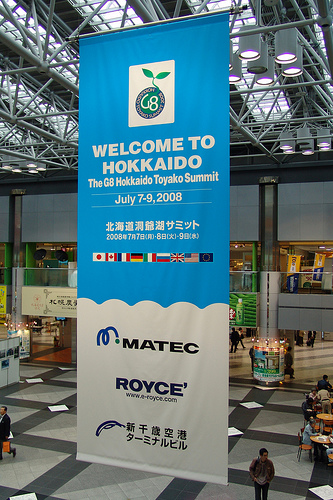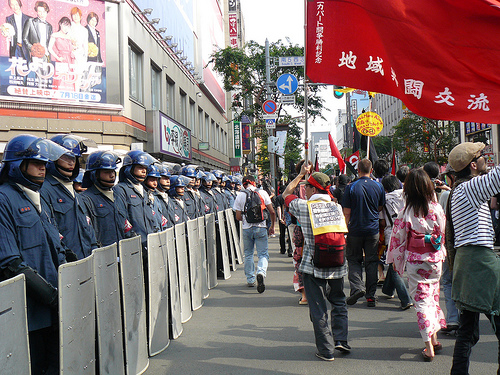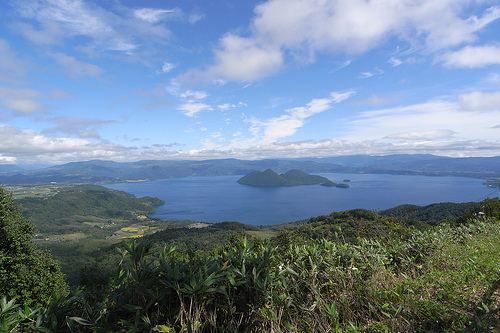The G8 Summit at Toyako, Hokkaido [ja], ended on June 9th after three days of meetings, leaving a bitter aftertaste for some bloggers in Japan. With a total cost for organization and security estimated as enough to treat millions of HIV patients, and protests by thousands of farmers and activists from around the world, the event was not without its controversy.

The G8 Summit – New CHITOSE airport (from Flickr user mujitra) CC-BY
Many bloggers questioned the high costs of the event, pointing out how environmentally unfriendly it was. Blogger gooorii, on the other hand, considered some of the outcomes of the G8 summit to have been positive:
何しろ討議する項目が山積しており、わずか3日間で各国のトップが話し合ってもなかなか纏まる話ではないと思うが、それでも「拉致問題」と言う文言が首脳宣言に載ったり、ジンバブエの不当な大統領選挙問題等にも共同声明のなかで、批判される事は国際的な見地から見た正しい意見として当事国にプレッシャーを与える事になり良いことだと思う。
今回の重要なテーマである、室温効果ガス問題では2日目のG8の中で討議され、福田さんは長期目標を2050年までに50%削減を決めたい意向であったが、アメリカの提案では、「大量排出国(中国・インド・ブラジル等)抜きの討議は無意味だ」と言う意見で賛成が得られなかった様で、私も当然の事であると思う。
[…]
しかし、兎も角、削減努力に対する必要性は各国とも同じであるから3日目の会合こそ大量排出の当事国が、同じテーブルに就いて、話し合いが出来るスタートラインに揃ったところであると私は思うのである。

The Oxfam G8 Big Heads at Big Letters Performance (from the Oxfam Flickr page) CC-BY-NC-ND
Blogger jg96aqkg, meanwhile, points out the irony of the G8 dinner:
環境問題、地球温暖化対策、原油高騰、食料危機、北朝鮮の核問題などなど話し合われたようですが凡人の私にはどのような実効性が有るのか全く分かりません。
あるメディアが食料危機の会議場で山ほど盛られた食膳に、あんなご馳走を食べて食料危機に餓えている人間の気持ちが理解できるのかと批判していました。
各国を代表して出席しているのだからどんな贅沢な食事をしょうがどうでも良いことだが世界各国一人一人の命の尊厳が図られる形になって欲しいものです。

Challenge the G8 Peace Walk (from Flickr user skasuga) CC-BY-NC-SA
Blogger mkj2 also picks up on the theme of the G8 feast, and writes:
各国の首脳が食べるディナーの話題。
地元の食材をふんだんに使ったメニューでカニだのアスパラだのいいもの使ってまっせっつー。
That there is going to be a lot of locally produced food on menu with good stuff like crab and asparagus.
[…]
別に食い物にいちゃもんつけてるわけじゃない。
食い物に始まり、警備だのなんだのに多額の血税が使われる。
それはいい。
世界のTOPが雁首そろえて諸問題を話し合うっていうんだから。
From the food to security and what not, a large amount of taxpayer's money is spent.
That itself is ok.
Because leaders from around the world are gathering and discussing various issues.
ただ。
頼むよほんと。
これだけの金かけて、手間かけて、ガソリンが安くならない、食品の値段が下がらない、なんてことになったらどう責任取るんだ。
Please, for god's sake.
With so much money and effort put into it, if the gasoline prices do not go down, and the food prices do not go down, how are they going to take responsibility [for all of this]?

Toyako from the windsor hotel (where the G8 Summit meetings were held, by Flickr user veroyama) CC-BY
Finally, blogger fookpaktsuen makes a novel proposal:
四国や九州からの警察の動員2万人余。……で地球温暖化が主要議題、ならこのサミット開催こそ「地球に優しくない」のが事実。もう国連活動に収斂されていいのでは? テロ襲撃が危険視されるなら各国首脳が一同に介せずSkypeで会議すれば良し。会場からほど遠き農牧地帯で120名のサミット反対デモにデモ参加者上回る数の警官が防備。異常。
(For more pictures of the G8 protests, see pics at the account of Flickr user Powless.)







3 comments
Some comments to the global food crisis:
According to various studies (e.g. check out http://www.independent.co.uk/life-style/health-and-wellbeing/health-news/the-big-question-is-changing-our-diet-the-key-to-resolving-the-global-food-crisis-809566.html , 100 million tons of grain are being diverted to make biofuel this year, but over seven times as much (760 million tons) will be used to feed animals to produce meat. Depending on the type of animal, it takes up to, and sometimes more than, 10 plant calories to deliver 1 meat calorie. Meat consumption is therefore by far the biggest waste of grain globally.
Possible ways of future nutrition without livestock are presented at http://www.futurefood.org